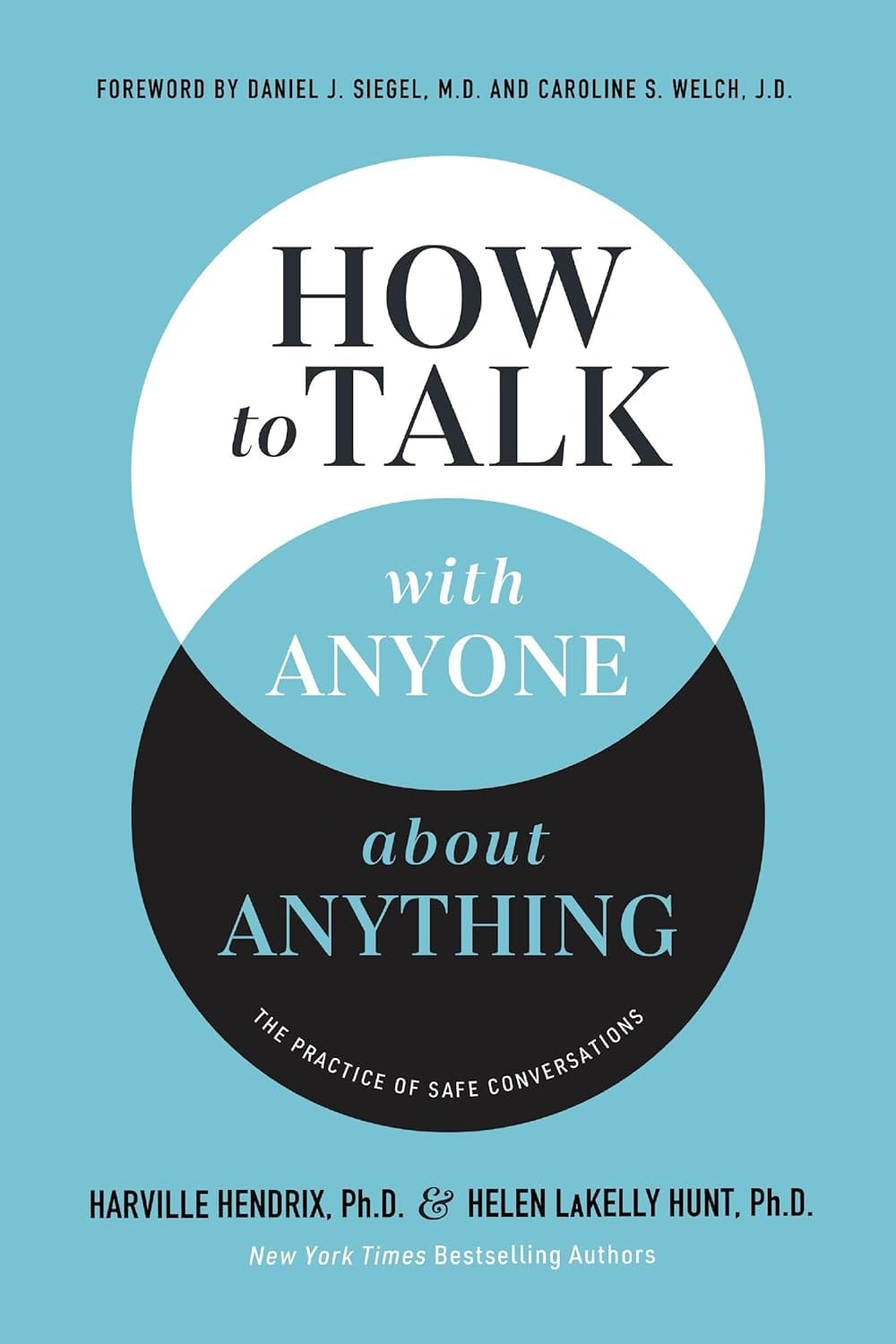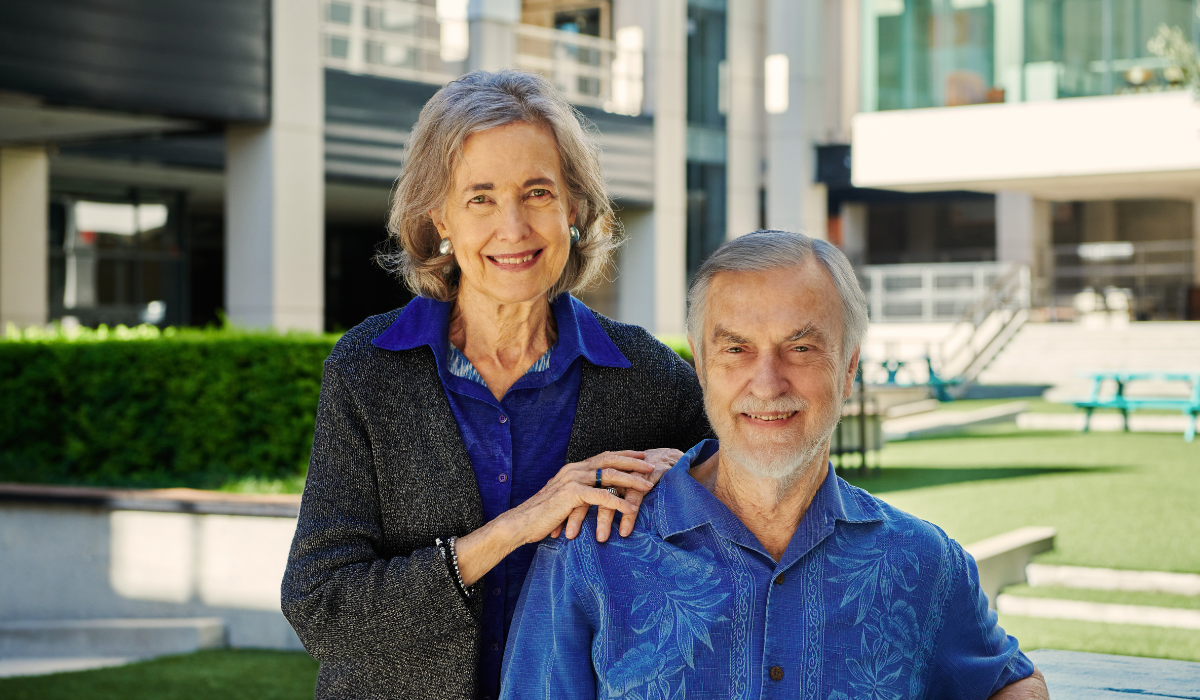How We Talk to Each Other Needs a Tuneup. Revered Therapists Harville and Helen Have 3 Tips for Where to Start
Talking is the most dangerous thing people do, said Harville Hendrix and Helen LaKelly Hunt over Zoom. The statement initially arrested us, but it became evident as the therapists and authors clarified. "What makes it dangerous is that nobody listens," added Harville.
Widely known by their first names, Harville and Helen have grown a following for their time-tested, researched-based tools for helping people better communicate and see one another. (Their first book, Getting the Love You Want, initially published in the 1980s, continues to help people have satisfying relationships.) The married therapists believe that the polarization in our world is a product of how we talk to each other, not what we talk about. "If people can learn the how," says Harville, "they can go to the what."
The good news is that the duo has created a method to help all of us get to the how. Their tools here offer a start to tuning up our dialogues, whether we're at home, in the office, or anywhere out in the world.
A CONVERSATION WITH HARVILLE HENDRIX,PHD AND HELEN LAKELLY,PHD
What are we getting wrong about how we talk to each other?
Harville: The way we've been talking for thousands of years is what Helen and I call parallel monologues. This is where we are each talking but not really listening. For a long time, we only had monologues, which was when the King or the Lord of the Manor did all the talking, and the people they oversaw listened to obey, carry out the orders, and not get themselves killed or put in jail. Then came the rise of the revolutions and we got to democracy, where we moved from monological monarchical talking to parallel monologues. The issue with parallel monologues is that they are focused on the self, on my point of view, and on talking. Helen and I concluded that talking is the most dangerous thing people do. What makes it dangerous is that nobody listens. So, we're bringing the absolute necessity of listening into the conversation. Listening with curiosity and acceptance so you can engage in a dialogue instead of in parallel monologues.
It may sound obvious, by why is listening so critical?
Harville: Well, what is interesting is there is very little research on listening. There's research on talking, developing your voice, and being authoritative, but there is little serious research on the value of listening, much less the technology of listening. We have two ears and one mouth, but we use our mouth way more than our two ears. The research on the ear—the organ itself—states that it has a 30 percent accuracy rate. So, on a good day, we miss 70 percent of what people say to us. Now imagine adding to that your own fantasy about what people are saying and the distortion rate—no wonder we have polarization! This all means listening must be increasingly focused on.
What do we overlook when it comes to having healthy dialogues?
Harville: Conversations are talking with: con means with. What we have, however, are polarizations. I talk, you talk, I talk, you talk. And we try to make each other look bad. What Helen and I want to add, and what we all must accept, is that people have different points of view. People will always have different points of view. Every brain on the planet has a different point of view, and we may not have agreement, but we can have understanding. We can collaborate and talk about the issues and collaborate around them, and then we can co-create the third option—one in which we all win so we can move into a dialogical space where we listen more than we talk.
Helen: Often, when we talk, we don't want the other person to think I'm right and you're wrong. We want the other person to think we're smart. That is why we put down someone who does something opposite from us. This is why listening and using dialogue with each other is so important; both people can end up with different opinions. That's okay! It's a democracy.
Helen, you have talked about difference a lot and have pointed out the wonder of seeing our differences. Why is this important in the context of dialogue?
Helen: At our workshops, I tell people that humans are a part of nature, and nature is dyadic: hot, cold, dark, light, sweet, sour, wet, dry. So, if your partner is different from you, you can wonder about it! They don't need to think exactly like you. Two people can live together in a harmonic relationship, even if they completely disagree on topics. Or two people can have a healthy dialogue even if they are voting for different political parties.
Harville: A human social problem is our objection to difference. But the problem with that is there is nothing but difference in the universe! We are all different.
What does healthy listening look like?
Harville: When you are talking, I have two options. I can hear, which means while you're talking, I will be thinking about how you're wrong or different from me. I will be running my own little story while you're telling your story. That's called hearing.
Or you can listen, which is when I turn off my story, and the only thing happening now is the acoustic waves coming from your mouth and the words you're saying. That is listening. It means I actually allow space for your point of view in my world, and not just as a courtesy, but as the fact that everybody sees something of reality and nobody sees all of reality. So, listening means being curious, exploratory, accepting, and letting another person's point of view live. Because the truth is, neither one of us sees the entire truth; we see a part of the truth, and the only part we can see is the part that we've been culturally conditioned to see.
Let's consider a common situation today. What steps can we take to have a healthy dialogue about a hard topic?
Harville: Let's say you're in the office, and you want to have a conversation about the political situation.
The first thing is to ask permission. Set an appointment. Don't just run up to them and say, "What do you think about you, Harris or Trump? Wasn't that debate terrible!" Instead, start with asking for permission. You could say, "I'd like to hear your thoughts," or "Would it be possible to have coffee and talk about what's going on in the political world? I am curious about your thoughts, and I'd like to share something of mine." Even after all these years, Helen and I always ask each other for permission. I never walk up to her and just start talking at her, that would be violating her space.
The second is curiosity. Listen to them. Turn off your story and let them come through. You can do this by mirroring it back to them, reflecting what you heard them say. You could say, "Let me see if I got that," or "Is there more?" or "This is what I hear." Keep mirroring and going back to curiosity. Mirroring and curiosity.
Then the last thing is to do a summary. You could say, "Here are the points I heard you making. Did I get it all?" This is a way to check for accuracy because, as I said earlier, we have a 70 percent distortion rate.
So again, start with permission, go to curiosity and mirroring, mirroring, mirroring, and then summarizing. With all of that, I think most any conversation will stand a chance.

Harville Hendrix, Ph.D. and Helen LaKelly Hunt, Ph. D are partners in life and work. As the founders of Imago Relationship Therapy, they have written over 10 books, including three New York Times bestsellers. Their new book is How to Talk with Anyone About Anything.
Please note that we may receive affiliate commissions from the sales of linked products.



